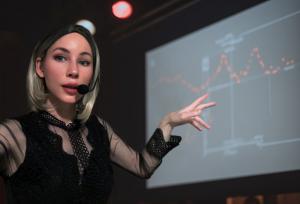Longevity Expert Establishes a New Benchmark in Consciousness Detection - New Future for Brain-Computer Interfaces?
A longevity expert, Dr. Berenika Maciejewicz, defines a new paradigm in the study of consciousness with potential applications in AI technologies.
MIAMI, FL, UNITED STATES, October 8, 2025 /EINPresswire.com/ -- A significant advancement in neuroscience has emerged, driven by the pioneering research of Dr. Berenika Maciejewicz—a distinguished neuroscientist holding two doctoral qualifications and a medical degree. Dr. Maciejewicz leads a biotechnology unicorn startup in the human longevity space called 600and1, bioengineering a legacy moonshot to extend human lifespan and health-span through targeting mitochondria. Through her exploration of lucid dreaming, discoveries were made uncovering the emergence of consciousness in the context of dream lucidity. Dr. Maciejewicz’s innovative work, initiated during her doctoral studies at London Metropolitan University, is reshaping our understanding of the human mind and holds promising implications for artificial intelligence and brain-computer interface technologies.
Lucid dreaming—a phenomenon in which individuals become aware they are dreaming and can consciously direct their own dreams—has long been considered the realm of science fiction. However, Dr. Maciejewicz has brought scientific legitimacy to this concept. With PhDs in Biomedical Engineering from the Einstein Medical Institute in Florida and in Neuroscience from London Metropolitan University, in addition to her medical degree, she has conducted extensive research into the cognitive neuroscience of dream lucidity phenomenon. Her findings demonstrate that the brain is capable of sustaining conscious awareness during REM sleep, thereby allowing individuals to direct their dream narrative, environments, and even dream characters.
“This represents a paradigm shift in neuroscience,” stated peer reviewer and commentator. “By identifying consciousness during sleep, we are not merely studying dreaming—we are unlocking untapped cognitive potential that may benefit millions of patients in coma and their affected families.”
Dr. Maciejewicz’s research, titled "Cognitive Neuroscience of Conscious Dreaming: Investigating Methodological Approaches to Detect Dream Lucidity in Sleep Studies", was published in the journal Neurology and Neurobiology by Science Repository. In it, Dr. Maciejewicz critically examines current methodologies in sleep research and contributes novel techniques for detecting lucidity during sleep. Her work validates the use of electroencephalography (EEG), eye movement tracking devices, and full-body monitoring by sonography as reliable indicators of lucid dreaming. Notably, she highlights a specific signaling method in which dreamers communicate their conscious awareness through a left-right-left-right eye movement, observable in conjunction with neurophysiological data.
This research extends far beyond the realm of intriguing dream phenomena—it represents a potential breakthrough in clinical neuroscience. Findings suggest that lucid dreaming may offer therapeutic benefits for individuals suffering from conditions such as chronic nightmares, narcolepsy, anesthesia awareness, coma or locked-in syndrome—states in which patients remain conscious but are unable to physically respond. By refining methods to assess consciousness, Dr. Maciejewicz’s work holds promise for advancing diagnostic tools and developing more effective treatments for complex neurological disorders.
What distinguishes this neuroscience advancement is its potential integration with emerging technologies. For instance, combining these methods of consciousness detection with brain-computer interfaces could enable novel applications, including enhanced dream-based interfaces or direct communication between the brain and external devices. This convergence of neuroscience and artificial intelligence may transform fields ranging from prosthetics to immersive virtual reality, advancing broader vision of human-AI integration.
“This research illuminates a new path toward understanding consciousness,” noted one prominent neuroscience peer reviewer. The implications of this study reach beyond medicine, offering valuable insights for disciplines such as psychotherapy, philosophy, and sports science, where cognitive control plays a critical role. By demonstrating that higher-order cognitive functions can persist and even be detected and measured during lucid dreaming, Dr. Maciejewicz has opened new avenues for exploring and utilizing the latent capabilities of the human mind.
Dr. Maciejewicz’s distinguished academic background underpins her pioneering work. With advanced medical training from Stanford and Harvard programs, and a unique interdisciplinary foundation in biomedical engineering and neuroscience, she is well-equipped to address some of the most pressing challenges in brain science. Her study encourages global collaboration and invites the scientific community to expand upon her foundational findings.
This new research is not solely about lucid dreaming; it represents a redefinition of consciousness and an essential contribution to the future of neuroscience and brain-computer interface technologies. This marks the beginning of a new era—where the boundaries between dreams and reality blur, and the full potential of the human mind comes into focus.
Timothy Andrews
PR Feed Media House
email us here
Legal Disclaimer:
EIN Presswire provides this news content "as is" without warranty of any kind. We do not accept any responsibility or liability for the accuracy, content, images, videos, licenses, completeness, legality, or reliability of the information contained in this article. If you have any complaints or copyright issues related to this article, kindly contact the author above.
